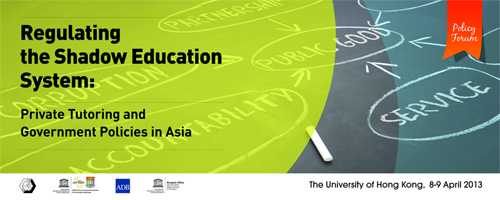
Regulating the Shadow Education System: Private Tutoring and Government Policies in Asia
A Policy Forum on “Regulating the Shadow Education System: Private Tutoring and Government Policies in Asia” was held at the University of Hong Kong on 8 and 9 April 2013. This Policy Forum was organized by the Comparative Education Research Centre at HKU in partnership with the Asian Development Bank and the UNESCO Bangkok regional office.
Focus and Rationale
The Policy Forum focused on the shadow education system of private supplementary tutoring. Some of this tutoring is provided one-to-one or in small groups, while other tutoring is provided in large classes and through the internet. In some countries, teachers provide extra fee-based tutoring alongside their regular duties. Many university students and others working on a relatively informal basis also provide tutoring. More formally, increasing amounts of tutoring are provided by companies, some operating on a trans-national basis.
The Policy Forum focused on the levels of primary and secondary education. It addressed fee-paying services, in contrast to ones offered free of charge by schools, families or community bodies. The discussion principally highlighted academic subjects (i.e. more science, mathematics, languages, etc.), rather than extra-curricular subjects. That focus underlied the metaphor of the shadow, which implied that this part of private sector operations in education mimics the regular schools – as the curriculum in the regular schools changes, so it changes in the shadow; and as the regular school system enlarges, so does the shadow.
Shadow education has long been a major phenomenon in some parts of Asia, but in other parts of the region has only recently become significant in scale and implications. Many governments are only beginning to address the matter, and relatively few governments have effective guidelines and regulations for the sector.
The Forum indicated that clearer policies and more effective instruments are needed throughout the region to encourage the positive dimensions of shadow education and discourage the negative ones. The positive dimensions include enhancement of academic achievements by learners, expansion of employment for tutors, and provision of support for families. The negative dimensions include expansion of social inequalities, excessive pressure on children and youth, and inappropriate practices in advertising and some other modes of operation. Policy makers, researchers and practitioners can learn much from each other within a comparative framework.
The instruments on which the Policy Forum included ones from the commercial sector as well as from the education sector. Examples in the commercial sector are requirements on registration of businesses, accounting, and safety of employees and clients. Examples in the education sector are class size and permission (or prohibition) for teachers to undertake private tutoring in addition to their regular duties. The
Policy Forum considered:
- laws,
- regulations,
- guidelines,
- codes of practice, and
- other relevant documents.
Some of these had a national focus, while others had a provincial, district or even institutional focus. Thus, variations existed within as well as across countries. The Policy Forum discussed the contexts in which these documents were introduced, the extent to which they are heeded, evolutions over time, and the factors which underpin effectiveness and ineffectiveness in the regulatory and guiding systems.
Participants and Venue
The Policy Forum brought together a range of stakeholders from around the Asian region. Some came from countries which have long been concerned about shadow education, particularly in East Asia, while others came from countries where the issues are only just coming onto official agendas.
Workshop Materials and Products
Participants were invited to supply in advance information on the policies and related regulations in their own jurisdictions (i.e. including sub-national entities, where relevant, as well as national ones). This information included not only the content of those policies and regulations but also the contexts in which they have been devised. It also included commentary on the mechanisms through which, and the extent to which, the regulations are implemented. The organisers prepared a partial a synthesis of these policies and regulations for discussion during the Policy Forum.
Participants were invited to give their own ideas about ways to follow up the Policy Forum with actions in their own jurisdictions and spheres of influence.
Personnel
At the University of Hong Kong, overall direction of the Policy Forum was undertaken by Mark Bray, UNESCO Chair Professor in Comparative Education. He was assisted by several colleagues, and particularly by Rattana Amp Lao, Post-doctoral Fellow in CERC.
In ADB, the focal point for partnership was Jouko Sarvi, Practice Leader for the Education Sector in the Regional and Sustainable Development Department.
In UNESCO, the focal point for partnership was Ramya Vivekanandan, Programme Specialist in the Quality of Education section of the Bangkok regional office.
- personnel from ministries of education,
- operators of tutoring centres,
- researchers,
- staff of international organizations concerned with education, and
- parents.












